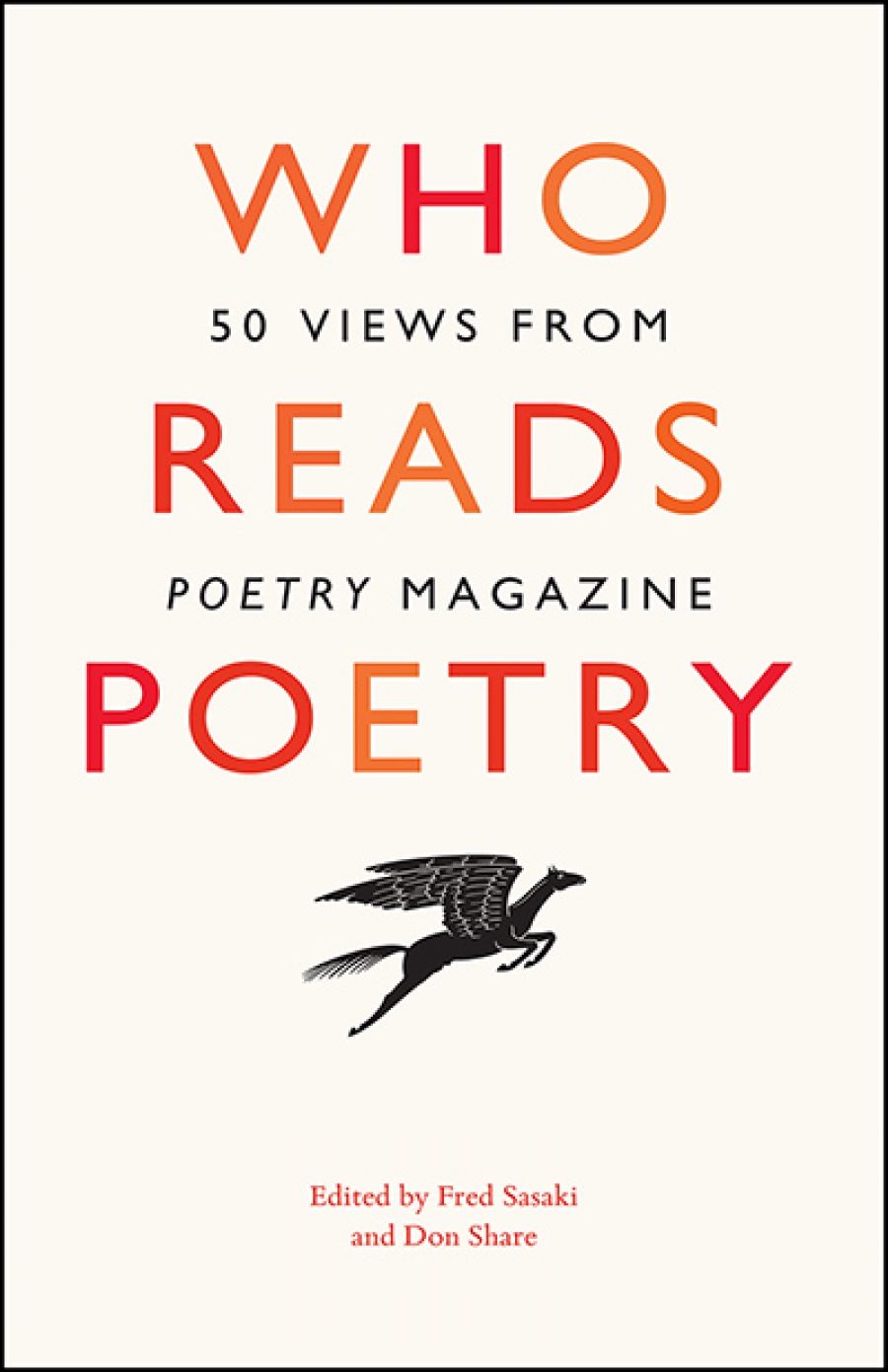
- Free Article: No
- Contents Category: Poetry
- Custom Article Title: David McCooey reviews 'Who Reads Poetry: 50 views from Poetry Magazine' edited by Fred Sasaki and Don Share
- Review Article: Yes
- Online Only: No
- Custom Highlight Text:
So, who reads poetry? American military cadets, that’s who. And medical specialists. Also, songwriters, journalists, and philosophers. And don’t forget (ex-) poets, priests, and politicians (to quote Sting). But let’s get back to those military cadets. What does poetry do for them? Who Reads Poetry gives us a number of ...
- Book 1 Title: Who Reads Poetry
- Book 1 Subtitle: 50 views from Poetry Magazine
- Book 1 Biblio: University of Chicago Press (Footprint), $49.99 hb, 215 pp, 9780226504766
Who Reads Poetry brings together fifty essays from the ‘View from Here’ column that appears in Poetry, the famous magazine based in Chicago. ‘The View from Here’ invites ‘readers from outside the world of poetry’ to discuss their relationship with poetry. Some of the contributors – such as Ai Weiwei, Roxane Gay, Christopher Hitchens, and Roger Ebert – might be reasonably well known in Australia, but for the most part the contributors are not celebrities (though many are artists and writers), and for the most part they are American. Indeed, one might say that this is a very American book. This ‘Americanness’ is not simply a question of where most of its contributors reside, or the fact that in 2003 Poetry received a $200 million grant (from the philanthropist and poetry lover Ruth Lilly). The contributors – who include the previously mentioned retired general, a baseball player, a pastor, activists, and various professionals associated with both élite organisations (academic, medical, or cultural) and less glamourous institutions (prisons, schools, and courts) – make up, it seems to me, an especially American mix. Who Reads Poetry isn’t just another chapter in America’s culture wars, but it does reveal something of both the diversity and stark divisions in American public life.
Perhaps the most basic division here is seen between those who view poetry as a discourse of power and those who view it as a discourse of play. The idea that poetry can teach ‘leadership’, as defined at West Point, is the most obvious example of the former. The Scottish singer-songwriter Momus (Nick Currie) neatly articulates the latter: ‘language is at its most charming when it abandons the will to power and substitutes pure play’. As the essay by the journalist Natalie Y. Moore illustrates, this latter model of poetry (with its links to childhood and maternal speech) also shows poetry to be a discourse of sociality and continuity.
As the lack of a question mark in its title suggests, Who Reads Poetry is largely, and thankfully, uninterested in poetry’s supposed ‘decline’. Nevertheless, the problematic nature of poetry’s cultural status is surely in evidence in the way the essays repeatedly worry over the relationship between poetry and everyday life, and between poetry and other discourses (science, religion, and politics). The artist-contributors here also focus on the relationship between poetry and other art forms. Poetry, these essays suggest, continues to haunt public and artistic life, despite its indisputably marginal status.
 Fred Sasaki
Fred Sasaki
The non-poetic art form most conspicuously on display here is a prose one: the essay. However much these essays extol poetry, they cannot but help simultaneously express the power of prose. Where Alex Ross – music critic of the New Yorker – attempts, and fails, to match the rhetorical power of poetry through a combination of lyrical hyperbole and musical jargon, the baseball player (and journalist) Fernando Perez, illustrates the power of plain prose. His essay begins, ‘I write from Caracas, the murder capital of the world, where I’ve been employed by the Leones to score runs and prevent balls from falling in the outfield.’ Now there’s a sentence.
But where numerous artists seek to celebrate the poetic nature of their artistic practice, Perez is refreshingly attuned to poetry’s profound difference from his day job. Baseball, he writes, ‘like any modern industry’, is alienating, whereas poetry: ‘is less susceptible to circumstance. I’m not especially touched when a poet deals with a ball game; I’m not especially interested in having one world endear itself to the other. Right now I need them apart, right now I’m after displacement, contrast. The thick wilderness of, say, late Ashbery can wrangle with the narrowness of competition.’ I can’t help but wonder how many people in Australian sport would be equally familiar with the poet John Ashbery or his Antipodean equivalent.
 Don Share
Don Share
But one doesn’t want to end with the whiff of cultural cringe. As a poetry professional myself, I came to this collection with – I must confess – a slightly jaundiced eye. By the end, I was astonished at what poetry was able to inspire. Who Reads Poetry reminded me that poetry, even today, continues to be associated with recitation and memory, music and emotion, and (yes) consolation and resistance. Just read the essays by Etienne Ndayishimiye (a Twa parliamentarian in Burundi) and the war correspondent Chris Hedges if you are in any doubt about the last two.
Not all the essays here are successful, but for the most part this is an extraordinary book. It has much to offer, to both those who are interested in poetry and those who are not.


Comments powered by CComment